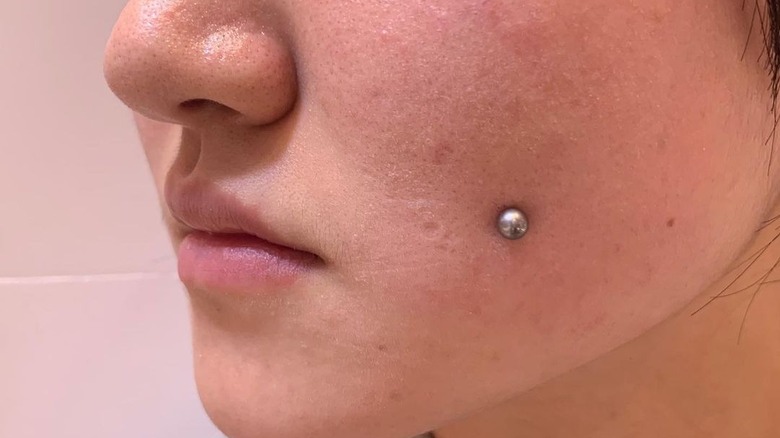What You Should Know Before You Get Your Cheeks Pierced
Kate Middleton, Mario Lopez, Jennifer Garner, Matthew McConaughey, Cameron Diaz, Harry Styles — what do they all have in common (aside from being attractive)? Dimples! They're something many people want, but less than half the world has, naturally. In fact, MedicineNet claims only about 25% of the world's population has dimples.
But, we're living in a time when there's no shortage of options to change your appearance if you're not happy with it. Born with brunette hair, but wish you were blond? You can dye it. Have a bob, but want long locks by the weekend? Try extensions. Wish you had dimples to enhance your smile? You can get your cheeks pierced. Or, if you already have those desirable cheek indentations, piercings would obviously enhance them.
If you're considering getting your cheeks pierced, there are a few things you should know, since it comes with some caveats that more traditional piercings don't.
It can be painful and expensive
Are cheek piercings painful? They can be. It ultimately depends on your tolerance for pain. If you've had a cartilage part of your body pierced, you'll likely find a cheek piercing to be less painful, since cheeks lack cartilage, as Medical News Today explains.
Blue Banana provides more specific details on the pain level. The clothing and accessories store ranked 16 body piercings from least painful to most painful, based on research and customer feedback. They ranked cheek piercing, which typically involves a dermal anchor, the ninth least painful out of 16. That means you might find that it hurts significantly more than an ear lobe piercing, but not nearly as much as a genital piercing.
After enduring the discomfort of the piercing comes the cost. CostHelper claims a cheek piercing will set you back $20 to $55, but Healthline lists the range at $40 to $100. Just as with many other service providers, prices vary by location and skill level or experience of the provider.
It comes with risks and unpleasant side effects
Having cheek piercings may look nice, but it can be risky, inconvenient, and uncomfortable — not just during the piercing, but after. According to Healthline, there's a chance that the piercer can accidentally pierce the salivary glands, since they're so close to the target area of the piercing. If these glands are punctured, the damage is permanent.
Another unpleasantry involves the aftercare process. According to Painful Pleasures, part of the aftercare requires swishing and rinsing with sea salt solution and mouthwash several times a day. Neglecting the aftercare routine can increase the risk of infection or an abscess growth, as Medical News Today claims. Make sure you receive detailed aftercare instructions from the piercer before you leave, and don't be afraid to ask questions if you're unsure about something.
Painful Pleasures lists several other risks in the form of potential side effects. These include bruising, hematomas, and excessive swelling. Healthline recommends that you see a doctor if your piercing "is bleeding, oozing yellowish puss, or increasingly red or swollen after a few days."
Getting your cheeks pierced can give you the appearance of dimples or highlight the ones you already have, but the process can be painful, expensive, dangerous, and inconvenient. However, Healthline claims a cheek piercing will fully heal in about eight weeks, if properly cared for.


